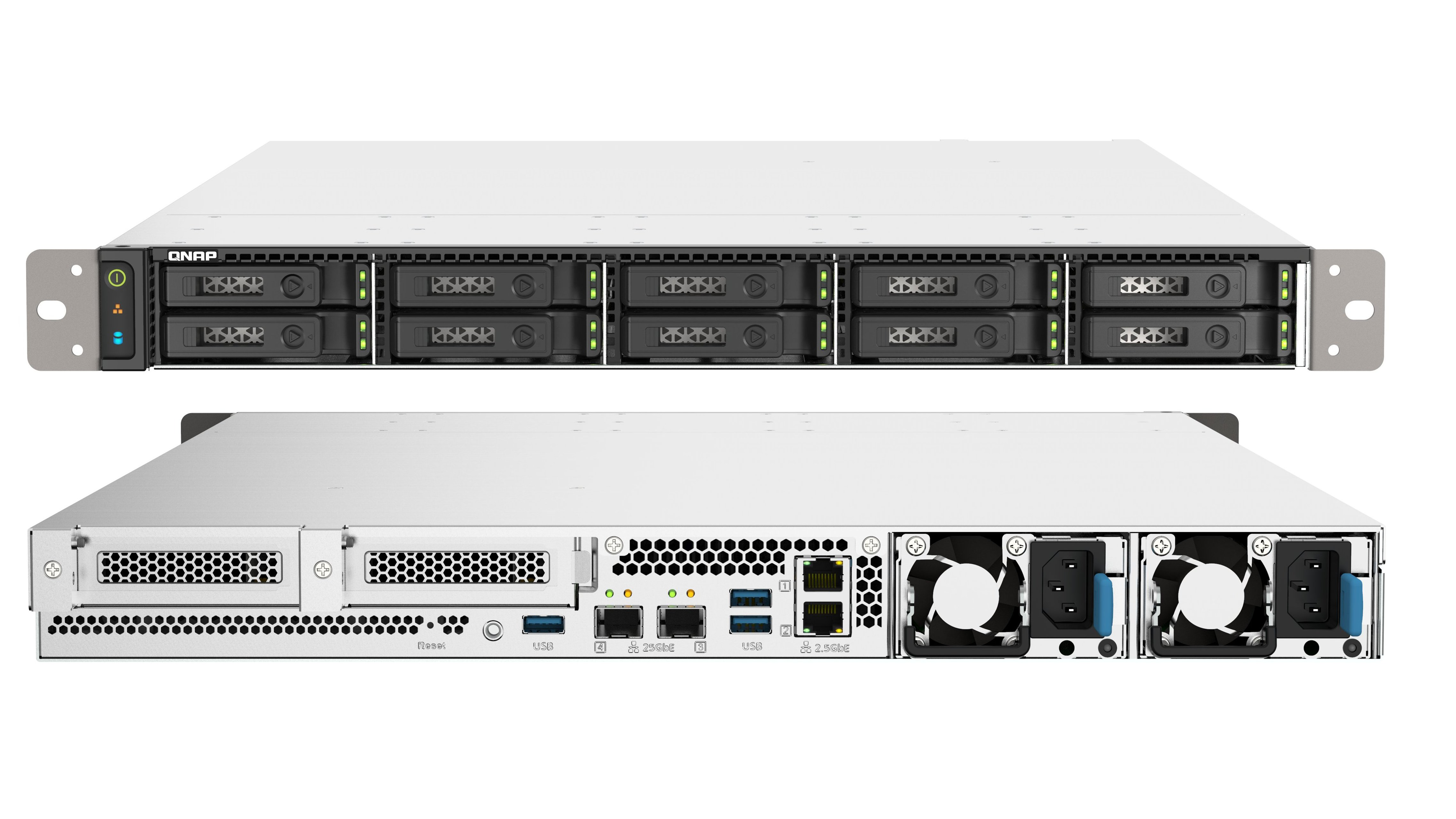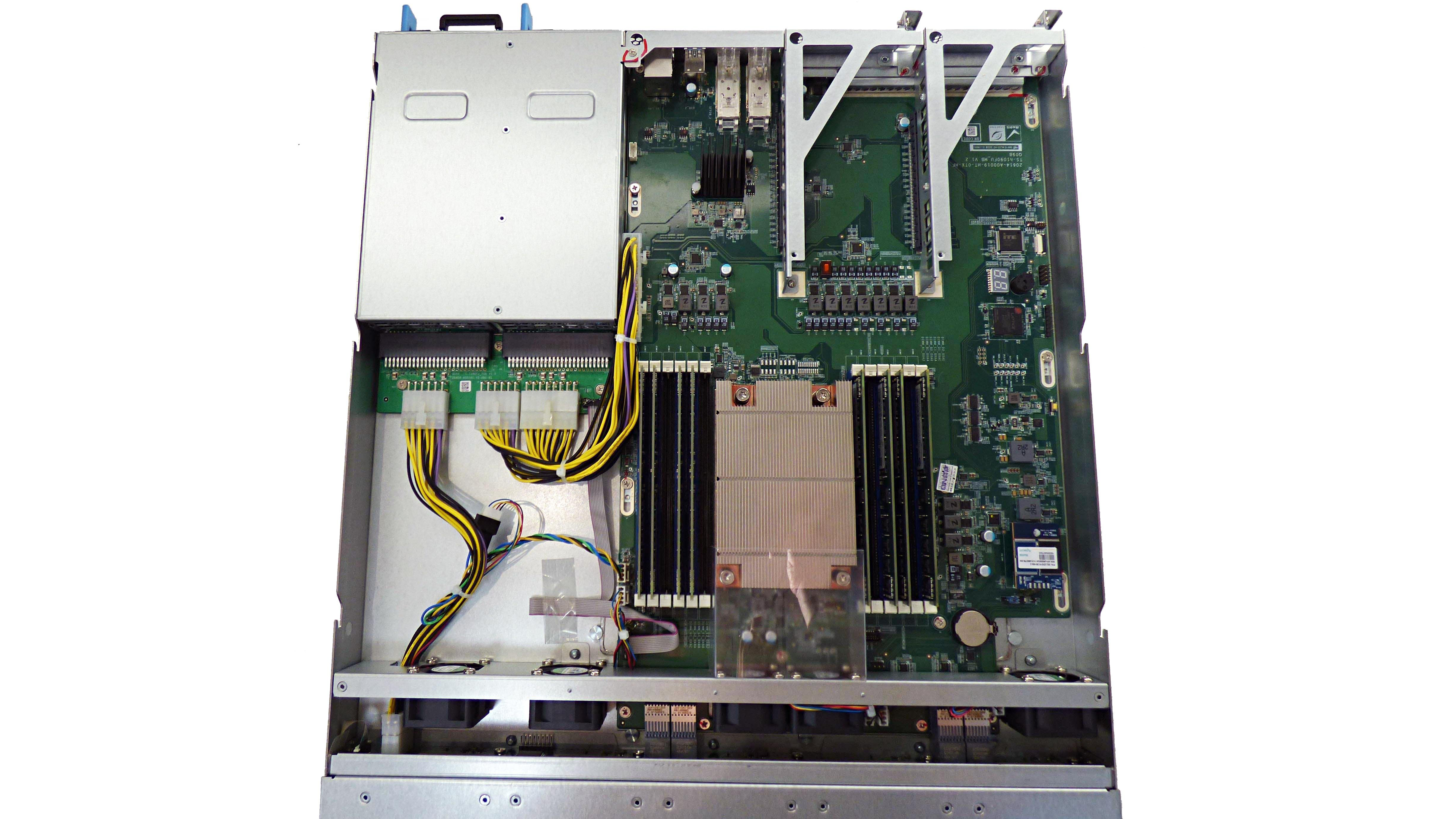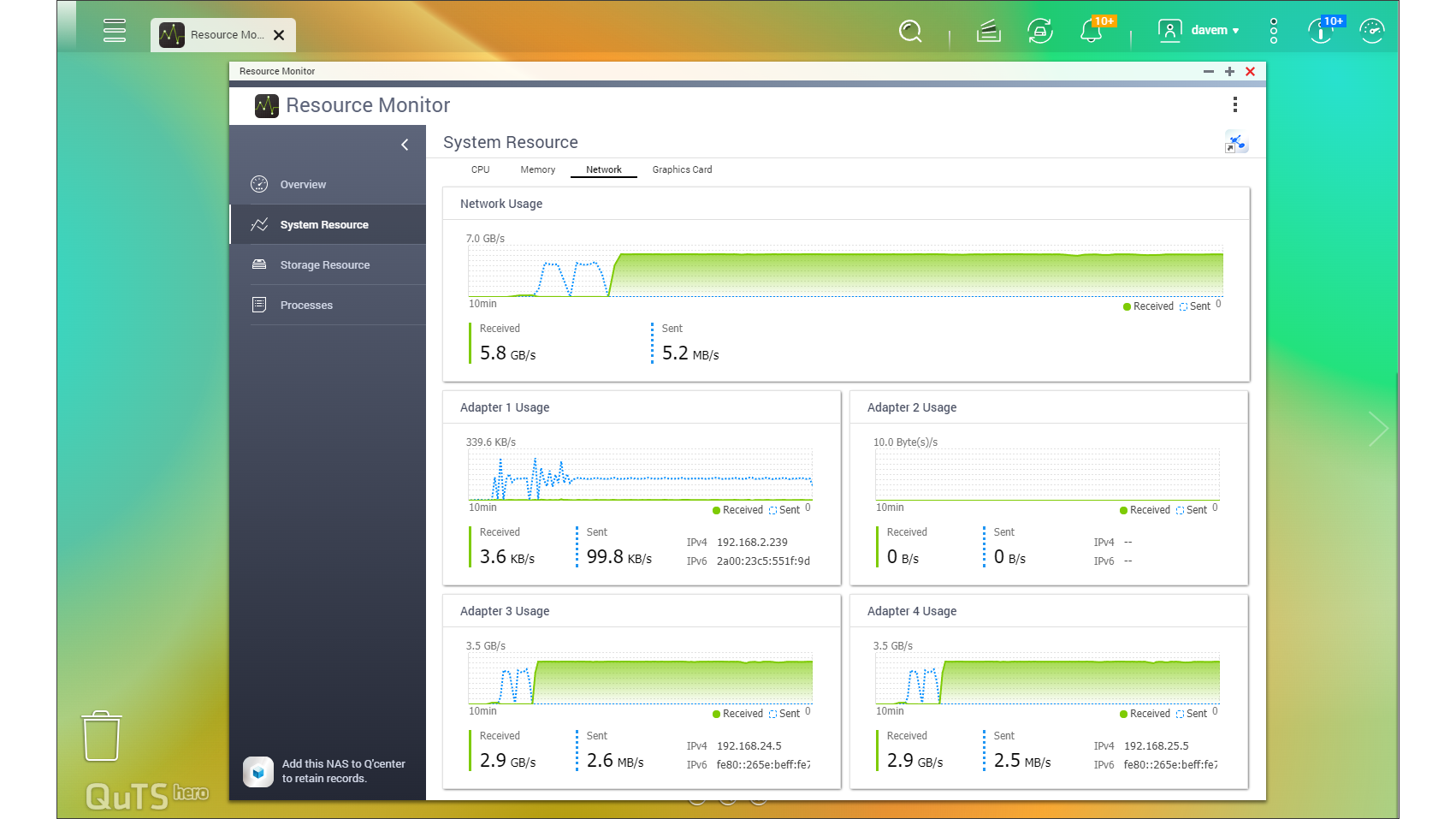Qnap TS-h1090FU review: Affordable flash in a rack
An entry-level all-Flash array with enterprise performance at an SMB price


-
+
Good value
-
+
Top 25GbE performance
-
+
NMVe and SATA SSD support
-
+
5-year warranty
-
-
Expansion slots fiddly to access

Qnap made its intentions on the enterprise all-Flash array (AFA) market very clear when it launched the TS-h2490FU last year. This 24-bay all-NVMe SSD beast offers a mighty specification at a price the blue chips won't be able to compete with. Since then, we've reviewed the TS-h1290FX desktop version and we now look at the TS-h1090FU rack array which aims to offer SMBs an even more affordable entry point into the world of high-speed storage.
The TS-h1090FU is presented in a short-depth 1U rack chassis with ten hot-swap drive bays at the front -- 14 less than the 2U TS-h2490FU. It offers the same storage choices as the TS-h1290FX, unlike the TS-h2490FU, as it also supports both U.2 form-factor NVMe SSDs and lower-cost SATA SFF SSDs.
There are no compromises in the engine department either, as the model we have on review is powered by a 16-core 3GHz AMD EPYC 7302P Gen2 CPU teamed up with a healthy 128GB of fast DDR4 memory upgradeable to 1.5TB. Qnap offers two other versions with one using the same CPU but partnered by a 256GB helping of memory while a budget-priced model comes with an 8-core 3.1GHz EPYC 7232P CPU and 64GB of DDR4.
High speed networking is the order of the day as the TS-h1090FU includes dual embedded 2.5GbE multi-Gigabit and 25GbE SFP28 ports. There's room for more ports too, as the appliance has two free PCI-E 4 expansion slots and is certified for a wide range of Qnap's 10, 25, 40 and 100GbE network adapters.
Qnap TS-h1090FU review: Design and expansion
The TS-h1090FU exhibits the build quality we've come to expect from Qnap with its solid steel chassis. The carriers are also metal and drive loading is simplified as they have mounting lugs on each side where you press the drives down until they click into place.
Cracking the lid reveals a tidy motherboard with easy access to all key components. The AMD CPU is looked after by a large passive heatsink and flanked on each side by six standard length DIMM slots with the base 128GB of memory supplied on eight 16GB modules.

Not that most SMBs will need it, but you can fit 128GB modules and push memory capacity to a whopping 1.5TB. The two expansion slots are presented on riser cards and fitting adapters is a fiddly process which requires each riser assembly to be removed first due to the limited space.
Chassis and CPU cooling are handled efficiently by six 6cm diameter fans arranged in front of the motherboard. During testing, we found the appliance was very quiet and certainly won't be noticed in a busy office environment.
Qnap TS-h1090FU review: QTS or QuTS?
During installation, the browser quick start wizard offers you the choice of Qnap's QTS or QuTS hero OSes but before diving in, think about the features you require as there are significant differences between the two. Furthermore, you can only swap from one to the other after backing up your data and reinitialising the appliance.
There's little to choose between them for app availability and their web interfaces are almost identical, but we think QuTS is the obvious choice. Although this OS has far higher memory demands than QTS, the massive 128GB in the TS-h1090FU unleashes all of its advanced data protection features.
The inline deduplication service requires a minimum of 16GB, the high-speed network ports are best served with at least 32GB and SSD cache sizes of up to 4TB are supported. There are many more benefits as QuTS offers inline compression, ZFS copy-on-write for fast, near unlimited NAS share and iSCSI LUN snapshots and end-to-end checksums for transparent self-healing of data corruption.

QuTS supports triple parity RAID to protect against three drive failures or triple mirroring to store identical copies of your data on three drives. NAS data can also be protected from tampering by applying one of two WORM (write once read many) policies during share creation.
Qnap TS-h1090FU review: NAS and IP SAN 25GbE performance
For our lab testing, we fitted ten 1.6TB WD DC SN640 U.2 NVMe SSDs in the appliance and used the QuTS Storage & Snapshots app to create a single RAID10 storage pool. Our test host was a Dell PowerEdge T640 tower server equipped with dual 2.1GHz 22-core Xeon Scalable Gold 6152 CPUs, 384GB of DDR4 plus a Qnap QXG-25G2SF-CX4 dual-port 25GbE adapter and running Windows Server 2019.
Starting with NAS testing, we mapped a share to the server over a direct 25GbE connection using a 2-metre DAC (direct access cable). We saw rock solid results with Iometer reporting a steady 23.1Gbits/sec for all sequential and random read and write operations.
Moving over to IP SANs, we created a 1TB iSCSI target, connected the server to it over a single 25GbE link and watched Iometer record sequential read and write speeds of 22.8Gbits/sec and 23.1Gbits/sec with I/O throughputs using 4KB block sizes measured at 116,500 and 141,500 IOPS. Changing to random operations saw read and write speeds of 22.7Gbits/sec and 22.9Gbits/sec and 116,500 and 113,700 IOPS.
With a dual 25GbE MPIO link to the target, we recorded sequential and random read and write speeds of 41.7Gbits/sec and 45.7Gbits/sec and 41.7Gbits/sec and 44Gbits/sec respectively. Our throughput results for sequential and random operations also increased nicely to 194,800 and 243,200 and 205,400 and 158,500 IOPS.
Qnap TS-h1090FU review: Verdict
As an entry-level native NVMe storage array, Qnap's TS-h1090FU is hard to beat as it offers a powerful hardware package at a very tempting price. The combination of AMD EPYC CPU and DDR4 memory delivers great NAS and IP SAN 25GbE performance, support for both Qnap's QTS and QuTS operating systems add extra versatility and Qnap sweetens the deal further by including a standard 5-year warranty.
Qnap TS-h1090FU specifications
| Chassis | 1U rack |
| CPU | 16-core 3GHz AMD EPYC 7302P |
| Memory | 128GB 3,200MHz DDR4 (max 1.5TB) |
| Storage | 10 x SFF U.2 NVMe/SATA SSD hot-plug bays |
| RAID | Qnap QTS or QuTS hero |
| Array support | RAID 0, 1, 5, 6, 10, 50, 60, (QuTS) - Triple Parity, Triple Mirror |
| Network | 2 x 2.5GbE, 2 x 25GbE |
| Expansion | 2 x PCI-E Gen4 x16 |
| Other ports | 3 x USB 3.2 Gen1 |
| Power | 2 x 550W hot-plug PSUs |
Get the ITPro daily newsletter
Sign up today and you will receive a free copy of our Future Focus 2025 report - the leading guidance on AI, cybersecurity and other IT challenges as per 700+ senior executives
Dave is an IT consultant and freelance journalist specialising in hands-on reviews of computer networking products covering all market sectors from small businesses to enterprises. Founder of Binary Testing Ltd – the UK’s premier independent network testing laboratory - Dave has over 45 years of experience in the IT industry.
Dave has produced many thousands of in-depth business networking product reviews from his lab which have been reproduced globally. Writing for ITPro and its sister title, PC Pro, he covers all areas of business IT infrastructure, including servers, storage, network security, data protection, cloud, infrastructure and services.
-
 ‘Phishing kits are a force multiplier': Cheap cyber crime kits can be bought on the dark web for less than $25 – and experts warn it’s lowering the barrier of entry for amateur hackers
‘Phishing kits are a force multiplier': Cheap cyber crime kits can be bought on the dark web for less than $25 – and experts warn it’s lowering the barrier of entry for amateur hackersNews Research from NordVPN shows phishing kits are now widely available on the dark web and via messaging apps like Telegram, and are often selling for less than $25.
By Emma Woollacott Published
-
 Redis unveils new tools for developers working on AI applications
Redis unveils new tools for developers working on AI applicationsNews Redis has announced new tools aimed at making it easier for AI developers to build applications and optimize large language model (LLM) outputs.
By Ross Kelly Published
-
 Google layoffs continue with "hundreds" cut from Chrome, Android, and Pixel teams
Google layoffs continue with "hundreds" cut from Chrome, Android, and Pixel teamsNews The tech giant's efficiency drive enters a third year with devices teams the latest target
By Bobby Hellard Published